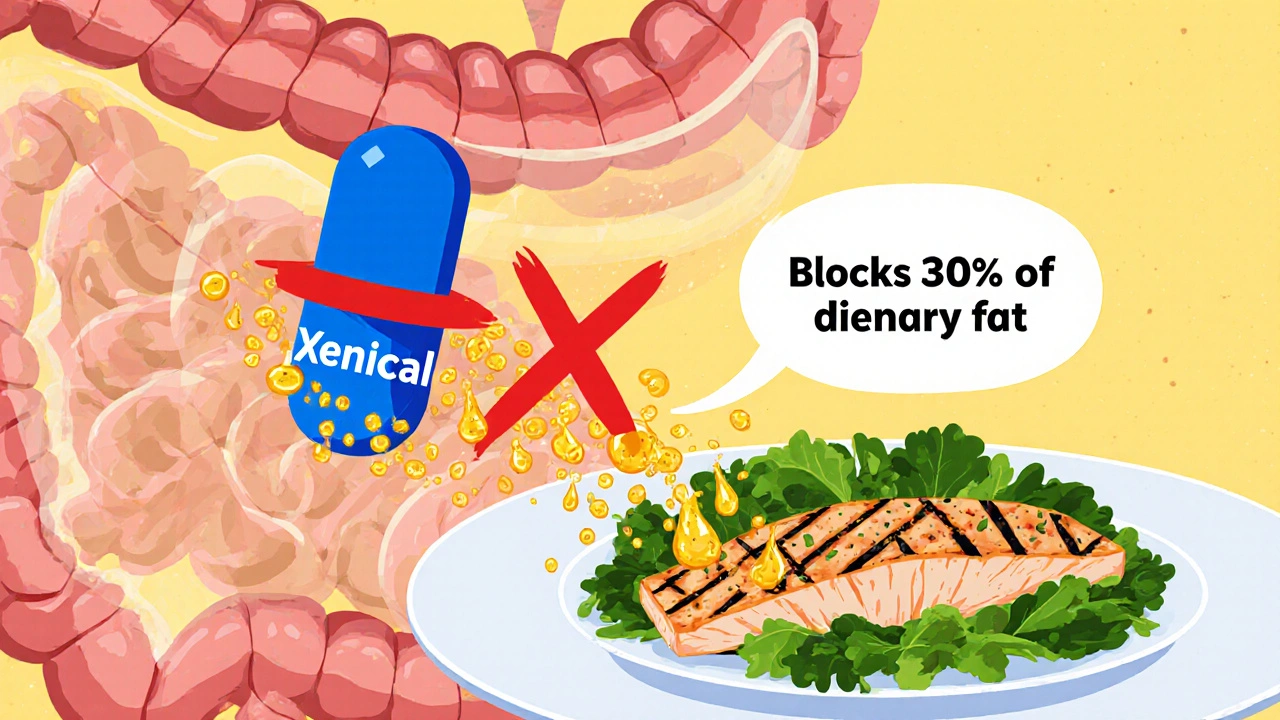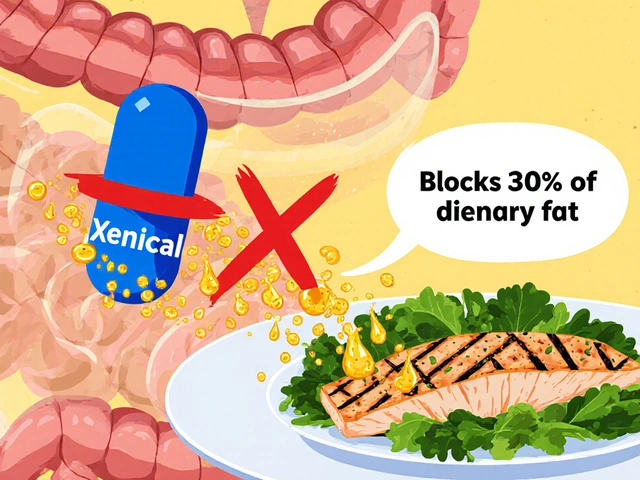Weight-Loss Medication Selector
Find Your Best Weight-Loss Medication Match
Answer a few questions about your health, budget, and preferences to see which medications are most suitable for you.
Important Note
This tool provides general guidance only. Always consult a healthcare professional before starting any weight-loss medication.
Looking to shed pounds but not sure which prescription or over‑the‑counter option fits your lifestyle? Xenical (the brand name for Orlistat) often tops the list, yet a dozen other drugs promise similar or even better results. This guide breaks down the science, cost, and side‑effects of Xenical and its most popular alternatives so you can pick the right plan without guessing.
Key Takeaways
- Xenical works by blocking fat absorption; it’s best paired with a low‑fat diet.
- Alli is the same molecule at a lower dose, available without prescription.
- Phentermine and Contrave act on appetite centers, offering faster weight loss but higher cardiovascular risk.
- GLP‑1 drugs like Wegovy and Saxenda provide the strongest results but require injections and are pricier.
- Choosing the right medication depends on your BMI, health history, and willingness to manage side‑effects.
Before diving into the table, let’s clarify how each drug fits into the broader weight‑loss landscape.
Understanding Xenical (Orlistat)
Xenical (Orlistat) is a lipase inhibitor that prevents about 30% of dietary fat from being digested. Approved in the UK for adults with a BMI ≥ 30, or ≥ 28 with weight‑related health issues, Xenical must be taken with each main meal containing fat. Because it works locally in the gut, it doesn’t affect the central nervous system, which means no stimulant‑type side‑effects.
Typical dosing is 120 mg three times daily. Common adverse events are oily spotting, flatulence, and urgency-often a sign that the drug is doing its job. Patients are advised to take a multivitamin (fat‑soluble vitamins A, D, E, K) at least two hours apart to avoid malabsorption.
Low‑Dose Orlistat: Alli
Alli contains the same active ingredient as Xenical but at 60 mg per tablet, sold over the counter. It’s targeted at adults with a BMI ≥ 25 who want modest weight loss (about 3-5% of body weight in the first year). Because the dose is half, side‑effects tend to be milder, yet the efficacy also drops proportionally.
Appetite Suppressants: Phentermine and Contrave
Phentermine is a sympathomimetic amine that stimulates norepinephrine release, curbing hunger. It’s usually prescribed for short‑term use (up to 12 weeks) and works best when combined with diet counseling. Cardiovascular side‑effects-elevated blood pressure, palpitations-limit its use in patients with heart disease.
Contrave blends bupropion (an antidepressant) with naltrexone (an opioid antagonist). The combination targets both reward pathways and appetite centers, producing modest weight loss (5‑10% body weight) over several months. Its safety profile is better than phentermine, but it can increase the risk of seizures in susceptible individuals.
GLP‑1 Receptor Agonists: Wegovy and Saxenda
Wegovy (semaglutide) is a once‑weekly injectable originally developed for type 2 diabetes. At a higher dose, it slows gastric emptying and reduces appetite, leading to up to 15% body‑weight loss in clinical trials. The main drawbacks are injection logistics and a price tag that can exceed £300 per month in the UK.
Saxenda (liraglutide) is another GLP‑1 agonist, administered daily. It offers 5‑10% weight loss, with nausea being the most common side‑effect. Insurance coverage is improving, but out‑of‑pocket costs still hover around £200‑£250 per month.
Older Options: Belviq
Belviq (lorcaserin) was an oral serotonin‑2C receptor agonist that modestly reduced appetite. The drug was withdrawn from the market in 2020 after a safety review linked it to an increased risk of cancer. It still appears in older comparison charts, so it’s worth noting why it’s no longer an option.
How to Choose the Right Medication
Below is a side‑by‑side comparison that captures the most important attributes for each option. Use the table as a quick reference, then read the detailed rows for nuance.
| Medication | Mechanism | Prescription? | Typical Dose | Common Side‑effects | Approx. Monthly Cost (GBP) |
|---|---|---|---|---|---|
| Xenical (Orlistat) | Lipase inhibitor - blocks fat absorption | Yes | 120 mg TID with meals | Oily spotting, flatulence, vitamin deficiency | £45‑£60 |
| Alli (Low‑dose Orlistat) | Same as Xenical, lower dose | No (OTC) | 60 mg TID with meals | Milder oily spotting, GI upset | £30‑£40 |
| Phentermine | Sympathomimetic - appetite suppressant | Yes | 15‑37.5 mg daily | Increased BP, tachycardia, insomnia | £20‑£35 |
| Contrave (bupropion/naltrexone) | Dual‑action on reward & appetite centers | Yes | 8 mg/90 mg BID | Nausea, headache, dizziness | £50‑£70 |
| Wegovy (semaglutide) | GLP‑1 agonist - slows gastric emptying, reduces appetite | Yes | 2.4 mg weekly injection | Nausea, diarrhea, constipation | £300‑£350 |
| Saxenda (liraglutide) | GLP‑1 agonist - daily injection | Yes | 3 mg daily injection | Nausea, vomiting, pancreatitis risk | £200‑£250 |
| Belviq (lorcaserin) | Serotonin‑2C agonist - appetite control | Withdrawn (no longer available) | 10 mg BID (historical) | Headache, dizziness, cancer risk | N/A |
Practical Tips for Maximizing Results
- Pair any medication with a balanced, reduced‑calorie diet. Even the most effective drug won’t work without a caloric deficit.
- Track your BMI and waist circumference weekly. Objective numbers keep you honest and help your clinician adjust dosing.
- Stay hydrated and include fiber-especially with Orlistat‑based drugs-to reduce gastrointestinal side‑effects.
- If you choose an injectable GLP‑1 (Wegovy or Saxenda), set reminders; missing a dose resets the therapeutic effect.
- Consult a healthcare professional before combining two weight‑loss agents. Interactions can amplify adverse events.

When to Avoid Certain Medications
Lifestyle changes alone
For individuals with a BMI under 27 and no metabolic disease, lifestyle modification is usually sufficient. Jumping straight to prescription drugs can expose you to unnecessary risk.
People with chronic pancreatitis, gallstones, or severe malabsorption should steer clear of Xenical and Alli because reduced fat absorption can worsen nutritional deficiencies.
Those with uncontrolled hypertension, cardiac arrhythmias, or a history of substance abuse should avoid phentermine and other stimulants.
Pregnant or breastfeeding mothers must not use any of these weight‑loss agents; safety data are lacking.
Real‑World Scenarios
Case 1 - Busy professional, BMI 32: The person tried multiple diets with little success. After a full medical review, they started Xenical alongside a Mediterranean‑style diet low in saturated fats. Within three months, they lost 8 kg and reported mild oily spotting that resolved after adding a multivitamin.
Case 2 - Post‑menopausal, BMI 35, high blood pressure: A stimulant like phentermine was ruled out. The doctor prescribed Contrave, monitoring blood pressure weekly. After six months, weight dropped 12 kg, and blood pressure improved slightly, likely due to weight loss.
Case 3 - Type 2 diabetic, BMI 40: The clinician chose Wegovy because it also improves glycemic control. The patient achieved a 15% weight loss over a year and reduced their HbA1c from 8.2% to 6.8%.
Bottom Line: Which Option Fits You?
There’s no one‑size‑fits‑all answer. If you prefer a non‑invasive, OTC route and can tolerate occasional GI upset, Alli might be enough. For rapid, clinically significant weight loss-especially if you have type 2 diabetes-GLP‑1 injectables like Wegovy are currently the gold standard, despite cost.
Always discuss your medical history, expectations, and budget with a qualified prescriber. The right choice balances efficacy, safety, and personal commitment.
Frequently Asked Questions
Can I take Xenical and Alli together?
No. Both contain Orlistat, so taking them together would double the dose and dramatically increase side‑effects without added benefit.
Do GLP‑1 drugs cause hypoglycemia?
When used for weight loss in people without diabetes, the risk of low blood sugar is low. If you’re on insulin or sulfonylureas, your doctor may need to adjust those doses.
How long should I stay on phentermine?
Phentermine is approved for short‑term use, typically up to 12 weeks. Longer use increases the chance of tolerance and cardiovascular side‑effects.
Is it safe to combine weight‑loss meds with diet pills?
Combining two prescription agents is generally discouraged unless a specialist designs a tailored regimen. Interactions can amplify adverse events.
What monitoring is needed while on Xenical?
Routine blood tests for fat‑soluble vitamins every 3‑6 months are advised, especially if you’re on a high‑fat diet. Also track weight and GI symptoms.



Comments
Orlistat works best when you pair it with a low‑fat diet and a daily multivitamin to cover A, D, E, and K. Keep the fat in each meal under about 30 g so you don’t get the oily spotting. Tracking your calorie intake will also make the drug’s effect more noticeable. It’s a simple add‑on if you stick to the plan.
Oh, great, another “miracle pill” list. As if we haven’t heard that line a hundred times from the glamorous advertising crowd. Spoiler: the side‑effects are the real stars of the show.
Alli can be a good starter for mild weight loss if you keep fat intake low.
If you’re not taking the time to actually measure your waist and BMI, you’re basically cheating yourself and anyone who cares about health. Skipping that basic step just to pop a pill shows a lack of responsibility. It’s not just about looking good, it’s about respecting your own body and the limits it sets. You can’t ignore the fact that any medication will only work with a genuine lifestyle shift, not a quick fix. So before you reach for Orlistat, ask yourself if you’re ready to change your eating habits in the long run.
Weight loss is often framed as a battle, but maybe it’s more of a dance with our own habits 🙂. When you treat a drug like a partner rather than a crutch, you find a rhythm that sustains you. Orlistat can help you step lighter, yet the music still comes from your daily choices. Keep your mind open, and the results might surprise you.
In Australia we’ve seen patients who ignore the fat‑limit and end up with worse GI issues than the drug’s intended effect. It’s not enough to just take a pill; you need to respect the dietary guidelines or you’ll waste money. Plus, the NHS pricing is nothing compared to our private options, so people here are even more motivated to follow the plan.
Wow, really, the sarcasm is noted, but let’s be clear-if you’re looking for a quick fix, you’re setting yourself up for disappointment, especially when the side‑effects start showing up-so maybe focus on sustainable habits, like balanced meals, regular movement, and realistic goals, instead of chasing the next hype.
Alli works for some but remember you still need to watch calories it isn’t a free pass it helps a bit but you’ll see real change if you cut carbs and move more.
Manish u think u knwo what ur talkin about but skiping the fat limit just makes the drug useless its not rocket science just follow the guide and u wont waste money.
Honestly, when I first read the endless list of weight‑loss meds I felt like I was staring at a menu from a fancy restaurant where every dish promises to change your life. You have Xenial, the low‑fat blocker, sitting there like the tofu of the group – it’s bland, it’s safe, and it will only work if you actually change your diet. Then there’s Phentermine, the spicy jalapeño, promising rapid results but leaving a trail of jittery heartbeats and sleepless nights. Contrave tries to be the sophisticated soufflé, mixing two flavors that sound fancy but can still make you feel a little queasy. The GLP‑1 injectables, Wegovy and Saxenda, are the Michelin‑star entrees – they’re pricey, they require a needle, and they can shave off a dramatic chunk of weight if you can afford the ticket. I’ve seen friends brag about losing fifteen percent on Wegovy while still complaining about the constant nausea that feels like a bad hangover. Meanwhile, Alli sits quietly on the shelf, the budget‑friendly version of Orlistat, promising modest drops if you don’t mind occasional oily spotting after a burger. The truth is, none of these drugs are magic wands; they’re more like tools in a toolbox, and you still have to do the heavy lifting yourself. If you ignore the diet and just pop pills, you’re basically paying for a fancy label on a broken treadmill. The side‑effects are not just footnotes; they’re the real cost you pay if you skim over the warnings. And let’s not forget the vitamins – you’ll need extra A, D, E, and K unless you want to be deficient. Some people think the injections are a shortcut, but they come with a monthly bill that could fund a small vacation. Others prefer the oral route, but then they have to deal with the “quick‑sand” feeling in the bathroom after a greasy meal. In the end, the best plan is the one that fits your lifestyle, your budget, and your willingness to stay consistent. No pill will rescue you if you’re not ready to make the day‑to‑day choices that matter. So pick the option that feels doable, talk to a doctor, and remember that your health is a marathon, not a sprint.